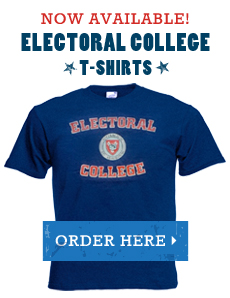There’s Something Funny About Voting in America
For starters, where is the Electoral College—and does it have a winning football team? Why does America have 13,000 voting districts, each with its own set of rules? And why are residents of our nation’s capital denied full voting rights?
Electoral Dysfunction, a feature-length documentary created by a team of award-winning filmmakers, uses humor and wit to take an irreverent—but nonpartisan—look at voting in America. Following a dual premiere at the 2012 Republican and Democratic National Conventions, the program was broadcast nationally on PBS and had its cable premiere in 2016 on Pivot. It can be viewed in streaming format on Vudu, iTunes, Google Play and Amazon Prime. It is also available on DVD for home, educational and institutional use.
Hosted by political humorist Mo Rocca — a correspondent for CBS Sunday Morning, a panelist on NPR’s hit quiz show Wait, Wait ... Don’t Tell Me!, and a former correspondent for The Daily Show with Jon Stewart — the film opens as Mo makes an eye-opening discovery: The U.S. Constitution does not guarantee the right to vote. Mo sets out to learn why the Founding Fathers deliberately omitted the right to vote from the Constitution—and to understand the consequences of this decision. His quest leads him to Indiana, which has some of the strictest voting laws in the country. He meets two impassioned local activists—Republican Dee Dee Benkie of Versailles and Democrat Mike Marshall of North Vernon—who take him inside their efforts to turn out every vote. Dee Dee, a member of the Republican National Committee who worked in Karl Rove’s office at the White House, has met her match in Mike, a veteran political consultant and former State Representative. Things heat up when the Republicans file a lawsuit challenging thousands of Democratic absentee ballots.
As he progresses on his journey, Mo explores the heated debate over Voter ID and voter fraud; searches for the Electoral College; gets to know a former felon who mistakenly believed she was disenfranchised for life; critiques ballot design with Todd Oldham; and encounters a range of activists, experts, and election administrators, along with some highly opinionated third graders, who offer commentary on how voting works—or doesn’t work—in America.
Woven throughout the film are sequences in which Mo meets reformers working to bring greater fairness and transparency to our election system. Among these reformers are proponents of the National Popular Vote Campaign, who have devised a plan to reform the Electoral College without a Constitutional amendment. Although this pragmatic measure—which would result in direct election of the President—has already passed in 31 state legislative chambers, it has received scant attention from the mainstream media. These stories carry the film into the future while giving viewers concrete steps they can take to help bring about change.












